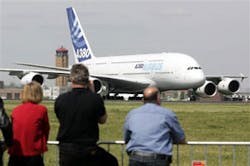Giant A380 Set To Test Out Heathrow
All being well, Thursday sees an Airbus A380 land at London airport for the first time to prove Heathrow's congested runways and terminals can take it. London-Singapore-Sydney will be the initial route for launch customer Singapore Airlines, once the first of 10 double-decker super jumbos are delivered later this year.
So far, 159 have been ordered, with bulk discounts on the list price of US$295 million each. Emirates, Qantas, Malaysian and China Southern are among the customers.
But airlines might like to think before doing this. New research suggests low cabin air pressure and poor oxygenation enhance the risk of deep-vein thrombosis (DVT). DVT occurs when a potentially fatal clot forms in leg veins during periods of sedentary activity. It has recently become a major issue with class action lawsuits by DVT victims blaming airlines for cramped economy seating on long flights.
The airlines retort that DVT can occur long after a flight which thus makes it impossible to establish a link. But new research commissioned by the World Health Organisation and published in British medical journal the Lancet, puts the ball back into the airlines' court, pointing the finger at cabin air quality as another potential risk factor.
Researchers in the Netherlands found that passengers who spent eight hours in an aircraft had a greater likelihood of suffering fatal blood clots than those who sat in a seat on the ground for a similar amount of time.
The blood of 71 volunteers aged 21 to 39 was studied before, during and after eight-hour flights.
They were also monitored while sitting in a cinema for eight hours. The study found that the airborne volunteers were more susceptible to blood-clotting, suggesting that "flight-associated factors" are the cause behind increased clot formation after a long trip, said the research team. A study in 2003 estimated that DVT may occur among one in every 100 frequent long-haul air travellers, in business class as well as economy.
That is potentially 8.5 people on a single-class A380. Opportunities to design aircraft from scratch do not occur often: This study should make airlines think seriously about the importance of space and air quality.
matter of focus
As the sole travel retail sponsor of the 16th ACI Pacific Regional Assembly gathering here last week, Hong Kong airport's largest retailer Nuance-Watson (HK) showed its commitment to the airport's commercial activities.
Part of several sponsorship initiatives by Nuance-Watson and Airport Authority Hong Kong to promote Chek Lap Kok to the global aviation industry, Nuance-Watson showcased its Terminal 1 stores with a preview of five shop concepts for Terminal 2, which opens in September.
Nuance group president chief executive Roberto Graziani said the maximisation of retail revenues could be achieved only if the trinity of operator, Airport Authority and vendor works in true partnership to put customers at the centre of their attention.
YIELD up, numbers down
Although occupancies dipped slightly over this year's 10-day China May Day holiday period, rates and yields continue to surge ahead. Figures for 52 hotels show that for May 1 Labour Day itself, occupancies averaged 86 per cent, down from last year's 92 per cent.
This year, rates that day hit a buoyant average of $1,040.84, up 18.13 per cent on $881.12 last year. The all-important yield per room number hit $895.30 for May 1, up a healthy 10.46 per cent on last year's $810.52.
Room rates and yields over the 10-day period performed even better. Average rates of $1,067.43 were achieved, up 16.13 per cent on last year's $919.19. Yields climbed 13.63 per cent to $890.54 this year, up from $783.69 in 2005.
Occupancies flagged by 1.83 per cent year on year, this year's 83.43 per cent down on last year's 85.26 per cent.
Copyright 2005 LexisNexis, a division of Reed Elsevier Inc. All rights reserved.
Terms and Conditions | Privacy Policy
News stories provided by third parties are not edited by "Site Publication" staff. For suggestions and comments, please click the Contact link at the bottom of this page.

